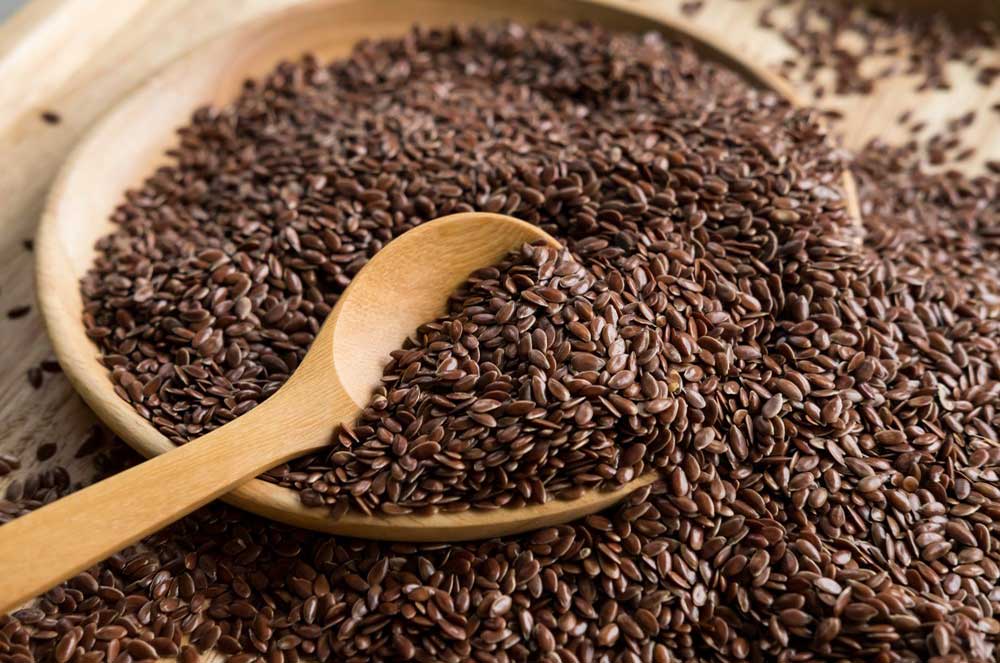
Is Flaxseed Good for Dogs?
The information available at your fingertips about different nutritional supplements and diets for your dog can be overwhelming. What’s worse is the different tips and advice that seem to change by the day. What doesn’t change are the ingredients behind each supplement or meal plan. And the road to proper health and nutrition is paved one ingredient at a time.
In this article, the ingredient to focus on is flaxseed. What is flaxseed and is it suitable for a dog’s body? To answer these questions and more, read on for the full breakdown and to ensure your pup is one step closer to their optimal diet.
It is worth noting here that we do not recommend feeding your dog or cat flaxseed. Look for a quality pet food that includes the proper amounts of flaxseed within the formula.
What is Flaxseed?
Flaxseed comes from the plant Linum usitatissimum (although “flax” rolls better off the tongue). This plant has many uses, including:
- Textile – Bed Sheets, underclothes, and tablecloths can be made from linen. Linen is a textile that is made from the fibers of flax stem. These fibers are two to three times stronger than their cotton alternative, and they come naturally straight. This makes it easy to harvest and sew.
- Wood Preservative – Linseed oil, extracted from flaxseed, is a useful green alternative to wood varnish. Its natural water-resistant properties preserve the wood from being exposed to the elements.
- Supplementation – Linseed oil, or more commonly referred to as flaxseed oil, has beneficial properties for both humans and dogs alike.
Flaxseed is also an ingredient in paints, stains, soaps, inks, and it’s even in the production of linoleum. Although, in this article, the focus will stick to its health and dietary benefits.
Compositional Breakdown: What is in Flaxseed
In order to understand the health benefits behind flaxseed, it’s important to understand its compositional breakdown. Just what exactly is in flaxseed that makes it a positive feeding resource for dogs?
- Omega-3 Fatty Acids – This is always the first nutrient people point to of flaxseed. Omega-3 fatty acids are known for a variety of benefits like reducing inflammation, potentially reducing the risk of cancer, and increasing brain functionality. While studies have conflicting data on all these, there are some tried and true benefits to omega-3s.
- Omega-3s from flaxseed offer your dog alpha-linolenic acid (ALA), which can be converted into EPA and DHA. These are two essential polyunsaturated fats that are linked to brain health, intelligence, depression, and other health problems.
- Omega-3s also offer anti-inflammatory benefits, which can assist in everything from lower blood pressure, healthier hearts, to reduced pain in joints and from arthritis.
- Soluble fiber – Gut health, experts are now realizing, is incredibly important. The microbiome created in your dog’s digestive tract (and in your digestive tract as well) is linked to brain functionality, the ability to process and absorb essential nutrients, and mood. Flaxseeds are high in soluble fiber, which acts as food for the bacteria in your dog’s gut.
- Thiamine – Thiamine is essential for metabolizing carbs. Your dog’s brain and other organs need diets rich in carbohydrates to operate properly. Thus, they need thiamine.
- Copper – Dogs need copper for multiple functions in the body. Copper helps form bones, collagen, and connective tissues, and it allows for the absorption of iron. The iron is needed for healthy red blood cells.
- Magnesium – A subtle nutrient that is absolutely essential for a dog’s health is magnesium. A healthy source of magnesium allows your dog’s muscles to regenerate quickly. Plus, it aids in the basic contraction and relaxing of muscles between rounds of fetch.
- Phosphorus – Phosphorus binds with calcium to make up the majority of bones. A benefit of getting phosphorus through a supplement like flaxseed is it’s best absorbed through natural ingredients.
What Are the Benefits of Flaxseed for Dogs?
Just reading about the compositional breakdown, you probably already have some idea of its benefits. To answer the original question—is flaxseed good for dogs—here are 6 reasons why that answer is an emphatic yes.
#1 Great for Digestion
Flaxseed has many benefits to the digestive tract. Because of its fiber content, it can help dogs manage the end of their digestion cycle. Fiber helps dogs that have issues with diarrhea and those with constipation. Plus, the soluble fiber, as mentioned above, is considered a great prebiotic (or food for probiotics).
#2 Healthy Coat and Skin
There are two main reasons a dog’s coat and skin become dry and irritated. One is diet; the other is stress. The unhealthy coat and skin are usually a sign of a deeper problem, so if you see this happening, investigate the underlying cause.
- Diet – If your dog isn’t receiving all of its vital nutrients, the skin and coat are some of the first signs to show it. The dry skin and fur are typically a sign that there is an internal disconnect and may suggest that your dog’s body is depleted of essential oils and fats. Thus, supplementing with flaxseed oil can be a healthy way of replenishing this.
- Stress – The other common cause of poor skin and fur is stress. If you’ve recently moved or changed your dog’s daily routine, this can cause your pooch stress. Also, remember that dogs are our best friends for a reason—they are empathetic creatures. If you are more stressed than usual, chances are, your dog is feeling the anxiety as well.
#3 Strong Bones and Flexible Joints
Looking back at the compositional breakdown, you probably noticed two key ingredients for dogs with hip or joint disorders: copper and phosphorus. During your dog’s puppy years, they are growing at tremendous rates. Within 12 to 18 months, your dog goes from a handheld plushie size to their full adult height and weight.
What this means is that your pup will need bioavailable amounts of the necessary nutrients to develop properly and live a long, healthy life. Offering your dog a supplement of flaxseed is an excellent way to ensure this.
Older dogs also develop hip and joint issues as the development of healthy collagen and the repairing of joints slow down. To reduce symptoms of inflammation, omega-3 fatty acids in flaxseed supplements can be the boost they need to live out their days as a springy, youthful dog.
#4 Antioxidants for a Tough Immune System
Flaxseed offers a reliable source of antioxidants that are beneficial for a robust immune system. Antioxidants help eliminate the body of free radicals. Free radicals enter your body naturally as cells decay. They also enter unnaturally through tobacco smoke, atmospheric pollution, car exhaust, and other airborne particles.
Free radicals are what cause illness and aging, and thus, are completely unpreventable in that regard. However, by absorbing antioxidants, you can slow this aging process down and allow your dog to be younger longer.
Antioxidants help your immune system stave off these cancer-forming, age-inducing free radicals. And a healthy immune system comes with additional benefits of:
- Being less prone to disease
- Your dog is better able to mitigate inflammation
- They are less likely to develop cancer
#5 Brain Health, Cognition, and Mood
The benefits of your dog getting enough ALA, EPA, and DHA cannot be understated. DHA, or docosahexaenoic acid, is one of the primary building blocks of the brain. That includes its healthy development during its puppy years and its functional use during its senior years.
DHA is best found in natural ingredients, one of which is flaxseed, but also includes:
- Eggs
- Fatty fish (such as salmon, tuna, halibut, and herring)
- DHA fortified drinks
#6 Helpful for Adrenal Issues
The adrenal glands in your dog control much of its response to stress, and they ensure the proper regulation of cortisol, digestion, and other regulatory functions within the body. It’s thought that as a dog ages, the adrenal glands produce less of the proper hormones that lead to their energy and exciting nature. When this happens, more than just their mood is affected—hair loss and lack of appetite are common in adrenal issues.
Flaxseed, eaten as whole seeds, has been shown to help with adrenal issues in older dogs, as it provides the dogs with lignans. Lignans are a type of polyphenol, or antioxidant, that comes from plant matter and help prevent hormone-related cancers.
Flaxseed Overdose, When is it Too Much?
In whole seed form, flaxseed is difficult to overdose on unless it’s the only thing your dog is eating—but in this case, any diet consisting of a single food will constitute malnourishment. Flaxseed oil, because of its concentration, can be too much for your dog’s digestive system. However, because it’s a natural oil, the symptoms of an overdose will become apparent immediately.
Your dog will either vomit it up or have runny diarrhea. In both cases, the digestive tract is expelling it as quickly as possible without absorbing more than it has to.
Flaxseed For Dogs Is It Safe?
Not only is flaxseed okay for dogs, but the benefits are far-ranging and exceptional. Adding a dose of this beneficial oil, meal, or whole seed to your dog’s diet can be the extra boost needed for a happy and healthy life.
For this reason, Lucy Pet includes flaxseed in all of their dog foods, including the limited ingredient diet food. Because of the healthy prebiotic fiber, even dogs with a sensitive stomach can benefit from the healthy properties of flaxseed.
Sources:
Natural Handyman. Linseed Oil – Its Uses and Limitations. https://www.naturalhandyman.com/iip/infpai/inflin.html
Oregon State University. Essential Fatty Acids. https://lpi.oregonstate.edu/mic/other-nutrients/essential-fatty-acids
Oregon State University. Lignans. https://lpi.oregonstate.edu/mic/dietary-factors/phytochemicals/lignans
Importance of Antioxidants for Dogs. https://www.lucypetproducts.com/blog/importance-of-antioxidants-for-dogs
How to Boost Your Dog’s Immune System. https://www.lucypetproducts.com/blog/how-to-boost-your-dogs-immune-system





Leave A Comment
You must be logged in to post a comment.